Mark Anthony Neal's Blog, page 601
July 6, 2016
Ibram X. Kendi on the Origins + Persistence of Racist Thought in America
 'Historian Ibram X. Kendi examines the history (and present) of racist ideas in America - from the anti-Black premise that liberalism and progressivism share with segregationism, to the ways capitalism, science and religion adopted and adapted racist ideology to maintain White supremacy - and explains why the only route to ending racism lies in dismantling the policies of discrimination, not attempting to alter or police the behavior of its victims. Kendi is author of Stamped from the Beginning: The Definitive History of Racist Ideas in America. --
This Is Hell! Radio
'Historian Ibram X. Kendi examines the history (and present) of racist ideas in America - from the anti-Black premise that liberalism and progressivism share with segregationism, to the ways capitalism, science and religion adopted and adapted racist ideology to maintain White supremacy - and explains why the only route to ending racism lies in dismantling the policies of discrimination, not attempting to alter or police the behavior of its victims. Kendi is author of Stamped from the Beginning: The Definitive History of Racist Ideas in America. --
This Is Hell! Radio
Published on July 06, 2016 06:47
Jesse Williams And Freedom: Love Note To A Tradition by Shana L. Redmond
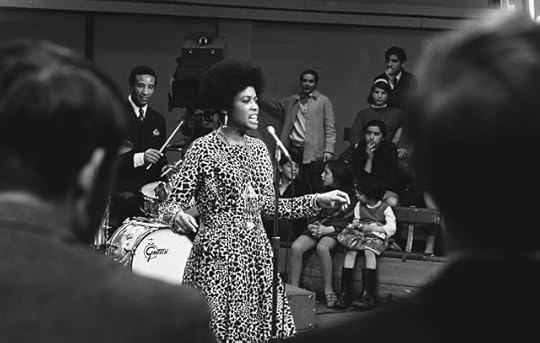 Abbey Lincoln + Max RoachJesse Williams And Freedom: Love Note To A Traditionby Shana L. Redmond | @ShanaRedmond | Huffpost
Abbey Lincoln + Max RoachJesse Williams And Freedom: Love Note To A Traditionby Shana L. Redmond | @ShanaRedmond | HuffpostThe 2016 BET Awards started with a sound we know—the voice of genius that we’re told is no longer: Martin Luther King, Jr. Curated by team Beyoncé and followed by her collaboration with super emcee Kendrick Lamar, King’s voice was the haunting to a night that both idolized the visionary brilliance of Prince and Muhammad Ali and suggested that there’s so much more yet to be done. The disembodied voice of King was, perhaps, an indictment of absent leadership but this recurrent concern is not about missing bodies. If we look and listen closely enough, we see and hear these powerful women and men, youth and elderly all around us. What we are nostalgic for is not a person but perhaps a style—not a group of readily identifiable people but a genealogy of thought.
The distinction between the loss of a figure and the loss of a tradition was powerfully displayed during Jesse Williams’s acceptance speech for the Humanitarian award. His comments sparked a standing ovation from his BET audience as well as the admiration of and hallelujah hand-waves from those of us at home. He began with an acknowledgement of those who made his work possible: his parents, wife, and the “real organizers...the activists, the civil rights attorneys, the struggling parents, the families, the teachers, the students” who are standing against “a system meant to divide and impoverish.” His descriptions of our world were delivered as clear, declarative statements; there was no pleading, no pandering, no equivocating. And all of this without sacrificing its poetry.
The beauty of his comments were in the candor and clarity of his thinking. His language moved listeners between the local and national conditions of Black life with ease, from praise for Black women who provide disproportionate care in our communities to the devastating murders of Tamir Rice, Rekia Boyd, and others. He argued that these lost loved ones are the evidence of a failed progress narrative; they mark “how far we’ve come,” which is not enough distance at all. Williams’s new timeline was also a mirror to the audience whose money, he argued, is not enough to protect us. Drawing parallels between the hot iron branding of enslaved people and the chosen branding of celebrities with designer names, his challenge was tailor-made for that extravagant event even as his critiques followed in a long history of artist activism.
It may be difficult to see through contemporary eyes but Williams is one of many. Paul Robeson was one of the most hyphenated artists of the twentieth century and used his stages to sing and speak for the rights of workers, liberation of African descended peoples, and a global peace agenda. Beginning in the 1930s, he argued against impartiality, famously proclaiming that “The artist must elect to fight for Freedom or for slavery. I have made my choice. I had no alternative.”
A student of radical intellectual W.E.B. Du Bois, Robeson too mentored others in this way, including actor-singer-activist Harry Belafonte. That Williams has assisted in bringing to the screen and will portray Belafonte in an upcoming biopic displays the integrity in casting that eluded the most recent efforts to document the large life of Belafonte comrade Nina Simone. Like Robeson, her unapologetic love for Black people and rebellious performances cost her the career that her talents warranted, forcing her into exile for more than twenty years.
These artists were and are beloved because they used their access to the stage to both expose corruption and encourage those communities abandoned by the systems and nations that claimed to protect them. Each one of them insisted on the word that Williams repeated on Sunday—freedom—and made it mean and do new things in the organizing that was already happening around them. This is why people listened. This is why people followed. This is also what made them dangerous.
The cost of being Robeson, Belafonte or Simone is well documented; surveillance, censorship, erasure, and violence are not only possible but likely, meaning that artists like them are few and far between. Many artists are well-intentioned. Some have their moments. But few consistently lead. And even fewer take the challenge from of the organizers to the stage. That is the tradition that Williams attached himself to and enlivened on Sunday.
This isn’t an ode to Jesse Williams. He wisely knows that the recognition is not about him. This is instead a love note to a tradition populated by Robeson, Belafonte, and Simone, Mahalia Jackson, Abbey Lincoln, and Janelle Monáe. And this is a wish for more artists who trust themselves and us enough to be visionary, to be courageous, and to ask tough questions of their art and careers. Ten years ago Black feminist scholar Hazel Carby posed the single most important question that I’ve ever received: “What’s at stake?,” she asked. This is the question that organizers ask themselves almost everyday and every thinker, writer, actor, singer, dancer, artist, and politician should ask themselves on a regular basis for the answer may get us closer to this elusive freedom.
+++
Shana L. Redmond, Ph.D., is Associate Professor of Musicology and African American Studies at the University of California, Los Angeles and the author of Anthem: Social Movements and the Sound of Solidarity in the African Diaspora (NYU Press, 2014).
Published on July 06, 2016 06:22
July 5, 2016
Michael Eric Dyson + Jonathan Capehart Talk Barack Obama and the Politics of Race in America
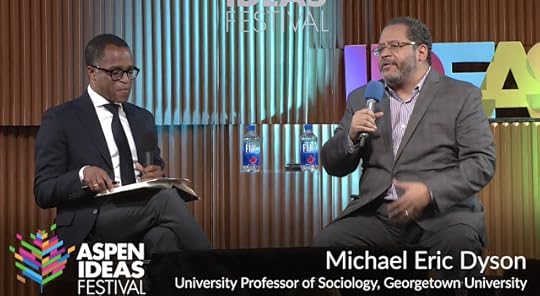 'As Michael Eric Dyson notes in the introduction to his 2016 book, “[President] Obama provoked great hope and fear about what a black presidency might mean to our democracy. White and black folk, and brown and beige ones, too have had their views of race and politics turned topsy-turvy.” Join Dyson and The Washington Post’s Jonathan Capehart for a look at how the politics of race have shaped Obama’s identity and groundbreaking presidency. How has Obama dealt publicly with race—as the national traumas of Tamir Rice, Trayvon Martin, Michael Brown, Eric Garner, Freddie Gray, and Walter Scott have played out during his tenure? What can we learn from the president's major speeches about his approach to racial conflict and the black criticism it provokes?' -- +The Aspen Institute
'As Michael Eric Dyson notes in the introduction to his 2016 book, “[President] Obama provoked great hope and fear about what a black presidency might mean to our democracy. White and black folk, and brown and beige ones, too have had their views of race and politics turned topsy-turvy.” Join Dyson and The Washington Post’s Jonathan Capehart for a look at how the politics of race have shaped Obama’s identity and groundbreaking presidency. How has Obama dealt publicly with race—as the national traumas of Tamir Rice, Trayvon Martin, Michael Brown, Eric Garner, Freddie Gray, and Walter Scott have played out during his tenure? What can we learn from the president's major speeches about his approach to racial conflict and the black criticism it provokes?' -- +The Aspen Institute
Published on July 05, 2016 04:59
Saul Williams on Poetry + Art + Resistance
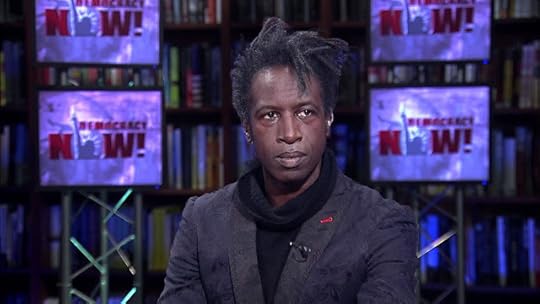 'In an extended interview, world-renowned spoken word artist Saul Williams discusses his career of mixing poetry, music and acting; reads some of his poetry; talks about how he became an activist; and describes the concept of his new album, MartyrLoserKing.' -- +Democracy Now!
'In an extended interview, world-renowned spoken word artist Saul Williams discusses his career of mixing poetry, music and acting; reads some of his poetry; talks about how he became an activist; and describes the concept of his new album, MartyrLoserKing.' -- +Democracy Now!
Published on July 05, 2016 04:35
July 4, 2016
How Public Outrage and Media Coverage Affect the Stanford Rape Case
 'Dayna Evans
, a staff writer for “The Cut” at New York Magazine, and
Claudia Garcia-Rojas
, a writer and coordinator at The Chicago Taskforce on Violence Against Girls & Young Women, discuss the role of public outrage and media coverage of the Brock Turner/Stanford rape case. Garcia-Rojas is the co-author of “Reporting Sexual Violence” an intersectional guide for journalists who cover sexual violence. She is currently also completing a doctorate degree in the Department of African American studies at Northwestern University.' --
WNYC-FM
'Dayna Evans
, a staff writer for “The Cut” at New York Magazine, and
Claudia Garcia-Rojas
, a writer and coordinator at The Chicago Taskforce on Violence Against Girls & Young Women, discuss the role of public outrage and media coverage of the Brock Turner/Stanford rape case. Garcia-Rojas is the co-author of “Reporting Sexual Violence” an intersectional guide for journalists who cover sexual violence. She is currently also completing a doctorate degree in the Department of African American studies at Northwestern University.' --
WNYC-FM
Published on July 04, 2016 14:51
UnderCommoning: Radical Resistance Within + Against + Beyond the Neoliberal University
 'Members of the Undercommoning collective discuss the social and economic burdens of the neoliberal university - from the precarious nature of adjunct employment, to the existential claustrophobia of an educational system geared toward the sole production of debt and workers - and explain how a new wave of radical organizers are finding solidarity and building alternative forms of research and education. The Undercommoning collective, recently published the letter "Undercommoning within, against and beyond the university-as-such" at ROAR Magazine.' --
This Is Hell Radio
'Members of the Undercommoning collective discuss the social and economic burdens of the neoliberal university - from the precarious nature of adjunct employment, to the existential claustrophobia of an educational system geared toward the sole production of debt and workers - and explain how a new wave of radical organizers are finding solidarity and building alternative forms of research and education. The Undercommoning collective, recently published the letter "Undercommoning within, against and beyond the university-as-such" at ROAR Magazine.' --
This Is Hell Radio
Published on July 04, 2016 14:33
What’s the Meaning of the 4th of July to Marginalized People?
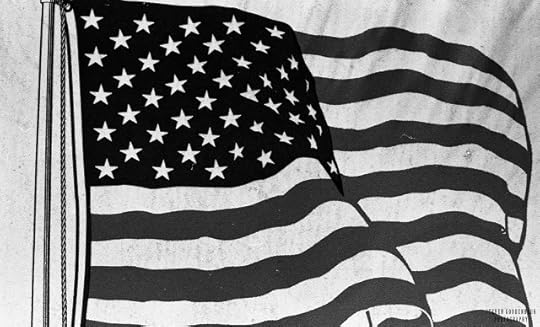 What’s the Meaning of the 4th of July to Marginalized People?by Lavonya Bennett | special to NewBlackMan (in Exile)
What’s the Meaning of the 4th of July to Marginalized People?by Lavonya Bennett | special to NewBlackMan (in Exile)On the fourth of July, Americans gather to celebrate freedom from the British Empire. During this time, we reflect on the way this freedom has positively impacted the United States’ historical foundations of global domination. However, this celebration of American history fails to wrestle with how the historical foundations of 1776 and beyond impact Euro-Western culture today. In 1852, Frederick Douglass asked and answered the meaning of the fourth of July to the American Negro. In 2016, I ask marginalized folks, allies, liberals, conservatives, and everyone in between, what does it mean to you now?
The men who developed and signed the Declaration of Independence were wealthy, white, misogynistic, slaveholding, Native American murderers, and the sole beneficiaries of the system of oppression they were creating. These men were supporting, enabling, or raping, killing, and beating women of color. They were intentionally stripping people of color of their culture and heritage in exchange for captivity.
Our ability to celebrate American historical milestones while ignoring the historical implications of systemic oppression is grotesque at best. If the work of the forefathers during this time were the breeding ground of current American success, then so it is also true that the ever-present systemic oppression that plagues marginalized communities is also a result of our American history.
We are under the impression that we cannot voice pride in American history while simultaneously acknowledging historic injustices. In 1776, all men were not created equal by the criteria expressed in the Declaration of Independence. Those considered equal were cis-gender, straight, wealthy, white, land-owning, able-bodied men. Anything outside of that limited archetype was not equal and was not free. Our societal fear of systemic change continues to create barriers in access to “Life, Liberty, and the Pursuit of Happiness.” This is evidenced when people choose to pursue happiness through resisting systems of oppression, but their inalienable rights are met with violence, hate, and exclusion.
As we remember the independence that the 13 colonies gained from the British Empire, we must also remember those who were not and still are not free.
For me, Independence Day is a day to recommit to fighting for equity and freedom for those who are not free in America. It is a time to remember that Native and sovereign people were subject to mass genocide and erasure on their land; that LGBTQ+ people of color are murdered en masse for being their authentic selves, that our Muslim friends are not able to freely practice religion, and that my beautiful, melanin-infused family around the nation are still enslaved in a “free” society.
July Fourth is a day to remember to fight for equity for people with disabilities who are only acknowledge when they can be a source of inspiration to the able bodied; to remember the working class who are deemed lazy while being the structural backbone of the American economy, and to remember undocumented immigrants who contribute to sustaining our economy through laborious work and contributing over 11 billion dollars to the American economy annually.
The Fourth of July holiday is a time to remember that just because progress towards equality and equity has been achieved to the comfort of the privileged, does not mean that we should not continue to push them. For me, the fourth of July is a time to not just remember, but to resist the oppression that was created and supported before, during, and after the Declaration of Independence. I hope, for you, it is a time to remember that failing to directly address the implications of historical oppression in America, we actively support those systems of oppression.
It is a great time to follow the words of Maya Angelou and “know better so we can do better.” And then, at that point it becomes a time for a good game of spades, seasoned chicken, and more than a little whiskey.
+++
LaVonya Bennett is an Administrator in Residence Life, a division of Student Affairs, and an adjunct instructor at the University of Oklahoma. She serves as a Directorate member with the Coalition for Women's Identities through the American College Personnel Association. She can be reached at: Lavonyabennett@gmail.com
Published on July 04, 2016 05:47
July 3, 2016
Monica Moorehead: The Revolutionary Black Woman Running for U.S. President by Sankofa Brown
 Monica Moorehead: The Revolutionary Black Woman Running for U.S. Presidentby Sankofa Brown | @SankofaBrown | special to NewBlcakMan (in Exile)
Monica Moorehead: The Revolutionary Black Woman Running for U.S. Presidentby Sankofa Brown | @SankofaBrown | special to NewBlcakMan (in Exile)Monica Moorehead is a 2016 U.S. Presidential Candidate representing the Workers World Party. Along with her running mate Lamont Lilly, Moorehead intends to reach working class and oppressed people around the country by talking about real issues and real solutions. This interview was conducted via email and transposed verbatim. Visit http://workersworldparty.org and follow the Moorehead/Lilly campaign via twitter @wwp2016.
[Sankofa Brown] I recently posted about your campaign on my Twitter account (@SankofaBrown) and the feedback, in my opinion, was phenomenal. A common response I received was, “Why haven’t I heard about her/this campaign before?” So let’s start there, can you tell me about your background as an organizer (some of the struggles you’ve been involved with), your political party affiliation, and a summary of your campaign’s platform?
[Monica Moorehead] I am a 64-year-old Black woman who was born under segregation in Alabama. My parents, who were professors at Alabama State, a historically Black University, participated in the historic Montgomery Bus Boycott in 1955-56, driving Black people to and from work. I became political as a teenager in Hampton, Virginia when I was kicked out of the band at a predominantly white school, for refusing to play the school’s theme song, “Dixie”, the anthem of the Confederacy. I first met with the Workers World Party (WWP) in the early 1970s while attending Hampton Institute (now University), another HBCU, as a supporter of political prisoners like George Jackson. I helped to distribute the Black Panther Party newspaper on the weekends.
It was WWP’s strong stance on fighting racism and national oppression that helped to broaden my political views that white supremacy along with many other oppressions are rooted and nurtured within imperialism, the worldwide system of capitalism. I have been mainly involved in fighting racism including defending Joann Little, a Black woman who was acquitted for killing a white guard who attempted to rape her in prison; fighting for the freedom of political prisoner, Mumia Abu-Jamal in Pennsylvania. I helped to found the U.S. Out of Southern Africa Network in the mid-1980s to demand that U.S. corporations get out of apartheid South Africa and to build solidarity with the African National Congress, Congress of South Africa Trade Unions and other allies.
Our platform is based on a number of principles: showing solidarity with workers and oppressed peoples here and worldwide who are engaged in struggles, big and small, against all forms of capitalist oppression, whether we agree with the ideas of the leaders or not. It is important for revolutionaries and activists to oppose their own imperialist governments in order to weaken those governments. The workers inside imperialist countries have more in common with other workers in developing countries. Ultimately, our goal is to influence as much of the working class as possible inside the U.S. to fight for revolutionary socialism.
[SB] Despite the fact Bernie Sanders’s popularity has made it somewhat easier to talk about socialism in America, many people still have a negative perception of socialism. How does socialism address the problems that people - particularly oppressed people - face in this country and abroad?
[MM] First of all, socialism is an economic system that is based on the workers, including oppressed peoples, being empowered to collectively take all means of production out of the private hands of the corporate bosses, to meet human needs. Socialism is comparable to a broad affirmative action program where those who have been denied the most under capitalism, are given preferential treatment to lay the basis of building parity, which is a process. Basically, socialism views the skills of all workers as respected, and pools them together to produce for the common good of all, but it will take a revolution to lay the basis for this transformation of society – be it strikes, shut downs, etc., on a broad societal basis. Socialism means uprooting the old repressive apparatus including the police, ICE, FBI, CIA, capitalist government agencies and replacing it with an apparatus that will administer real change.
[SB] A common rebuttal to the radical change you’re calling for is that it is unrealistic and that it cannot come to form within this country. How do you respond to that critique?
[MM] I would say that the conditions are more than ripe for a socialist transformation due to the fact that the productive forces (that is, industries and services based on technology) are on such an advanced level, including a highly developed working class – whether workers are employed or unemployed, skilled or unskilled. While all the wealth is produced by the workers, the main contradiction is that all the wealth is stolen and controlled by the bosses who do not pay the full value of what workers as a whole produce as a class, which are wages. Once the production is taken out of these private hands and liberated by the workers, it will help with an easier transformation from capitalism to socialism, including creating institutions that promote equality amongst all peoples regardless of their nationality, geography, language and history.
[SB] There are some who see the entire electoral process as rigged, corrupt to the core, and a mere show by the elites to continue the illusion of democracy. This perspective leads some people to see voting as a waste of time. What role does engaging in the elections have in a revolutionary struggle?
[MM] It is important for revolutionaries to engage in the electoral arena because it is another strategy and tactic to reach out to workers and oppressed peoples. Every four years our class is saturated day in and day out about the importance to vote for a Democrat and Republican, which is no choice at all. Whenever WWP has made a decision to run national candidates, we make it clear from the jumpstart, that the elections are a fraud and a set-up; that voting for one capitalist politician over another one will not make our lives better; that conditions will not fundamentally change for the better; that politicians represent the interests of Wall Street and banks; that capitalism is a system that can’t be reformed by policy which is the main message of someone like a Bernie Sanders, who has the allegiance of millions of young people who are anti-Wall Street. Our election campaigns speak to the issues of the day and the need to building solidarity with the most oppressed, i.e. Black people, Latinos/as, Muslims, immigrants, women, LGBTQ people, prisoners, young people who are disenfranchised and marginalized on a daily basis by the status quo.
[SB] Donald Trump’s sensationalized campaign of white nationalism has created a “Defeat Trump by any means necessary” attitude around the country. Some people believe voting for Hillary Clinton - despite her not being their ideal candidate - is the only practical way to defeat Trump. This is essentially the common “lesser of two evils” narrative. Do you believe that a Trump presidency is more dangerous than a Clinton presidency? Why should people consider supporting a third party candidate in this election?
[MM] We can certainly sympathize with those who see the Trump candidacy being more of a danger than Clinton’s especially if they are Mexican, Muslims and women. Trump’s rhetoric is more incendiary, openly racist and neo-fascist in character. The Clinton candidacy, however, is just as dangerous as Trump’s, if not more so because she is the darling of the Wall Street establishment and the Pentagon. As Secretary of State under Obama, she was the main representative of U.S. imperialist policy whether it was the overthrow of the Muammar Gaddafi regime in Libya in 2011 or the overthrow of the democratically elected government in Honduras in 2009. What makes Clinton so dangerous is that under the guise of being pro-woman, pro-union, etc. she is using anti-Trump fear to force the masses to vote for her and the Democratic Party, which has the same goals as the Republicans; that is to continue to carry out the neoliberal policies of austerity and war on behalf of the profits of big business. People should support third party candidates like our candidates because we tell it like it is by exposing capitalism and the dangerous plans its politicians have in store for our class, and why we need a united fightback.
[SB} What distinguishes your campaign from other Third Party campaigns on the left?
[MM] Besides promoting independence from the big business parties, we use our election campaign to help orient others on the left on why it is important to be a part of a united front to forward a revolutionary agenda for socialism. The revolutionary left is weak inside the U.S. and worldwide and anytime a revolutionary Party inside the U.S. can help promote left or socialist unity, it helps strengthen morale and confidence within the movement and our class. We have more in common than we think.
[SB] Whether to his demise or triumph, Bernie Sanders has intensified the conversation about getting money out of politics. For the sake of transparency, do you mind saying how your campaign is financed?
[MM] All of our campaigns are financed by our members making contributions and mass fundraising amongst allies and friends.
[SB] Despite who is elected for President in November, what should working class and oppressed people do to create the change they want to see?
[MM] By joining an organization that they feel seeks the change they want to see happen because it won’t happen with an election. Once the elections are over in November, the economic attacks on the part of the billionaires will intensify because the capitalist economic crisis will intensify, so the activists and revolutionaries must be ready for the challenge of fighting back collectively which also means not allowing racism, sexism and other artificial forms of inequality divided us. [SB] What can people do to support your campaign? [MM] People should go to workers.org/wwp/ and click on the "Get Involved" tab and fill out the form. That website will also have our campaign statements, fightback program, mobilizing protests at the Republican and Democratic National Conventions in July, how to donate to our campaign and more. ■
Sankofa Brown is a writer, organizer, and PhD sociology student based out Kinston, NC. Follow him on Twitter @SankofabBrown.
Published on July 03, 2016 15:37
"My One And Only Love" (1963) -- John Coltrane & Johnny Hartman
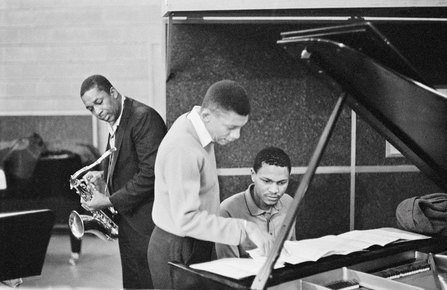 A collaboration that was brilliant in its simplicity and its execution; John Coltrane and vocalist Johnny Hartman (picture with McCoy Tyner on piano).
A collaboration that was brilliant in its simplicity and its execution; John Coltrane and vocalist Johnny Hartman (picture with McCoy Tyner on piano).
Published on July 03, 2016 10:39
July 2, 2016
Blackness in an Eyeball Cultural Economy by Mark Anthony Neal
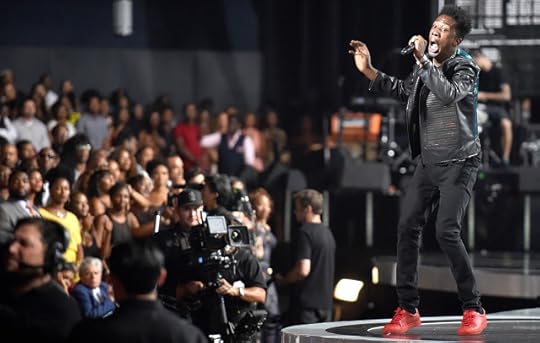 Blackness in an Eyeball Cultural Economyby Mark Anthony Neal | @NewBlackMan | NewBlackMan (in Exile)
Blackness in an Eyeball Cultural Economyby Mark Anthony Neal | @NewBlackMan | NewBlackMan (in Exile)Been around long enough that to complain about Black Entertainment Channel’s programming is cliche; It is also intellectually disingenuous, as the BET of 2016 bears little resemblance to that of, say 1996, or 2003, right after the Robert Johnson sold the network to Viacom. The media eco-system has shifted enough that BET has legitimate competition, has developed quality original program for a multi-platform approach to reach a diverse demographic -- and with the emergence of broadband, audiences have a wide range of alternatives, even if they might have to hustle a bit to find them.
It is with this framing that I engaged this year's BET Awards broadcast, which in recent years has been the network’s most watched programming. Indeed this year’s show’s ratings were up 11% from last year -- this despite going up against the season finale of Game of Thrones -- making it the most watched cable awards broadcast this year. The program’s singular importance is witnessed in Beyonce and Kendrick Lamar’s opening performance and the fact it was simulcast on 11 of Viacom’s other cable networks.
Say what you want about the flagship network’s regular programming, what the BET Awards attempts to achieve in that balance between keeping the lights on and nurturing the network’s role as a legacy keeper of mid-to-late 20th Century Black culture, might be unprecedented -- and unsustainable beyond a night-or-two, hence the increasing profile of the Centric network.
Case in point, one of my longtime interlocutors recounted watching the broadcast with his partner and adult daughter, where he and his wife reveled in Erykah Badu’s choice of “Ballad of Dorothy Parker” in her tribute to Prince, while their daughter admitted to have never seen Purple Rain. Said interlocutor excitedly watched Bilal sing “The Beautiful Ones”, while his daughter wondered who Bilal was, but in that I’d like to get to know him kind of way. Of course both parents sat confused when Desiigner pranced on stage to his hit “Panda.”; That is the BET Awards Experience.
From my vantage, there is some joy to be garnered from watching young folk react to the music and culture that moves them, something that I don’t quite experience, even with teenage daughters, who are unlikely to get turnt-up with dad in the room.
But during the course of the BET Awards show, you never lose sight of the fact that this is the best opportunity for the network to sell its brand. The network’s cadre of reality show stars and talk show hosts are given a level of prominence in the show that can be disconcerting, but also reveals their importance to the brand. Many of these “stars” push out their respective chests -- the hes, the hers, and the theys -- with a level of self importance because of their half-a-million instagram followers. And indeed in this environment of clicks, and shares, and likes, they are important to the enterprise of the marketing, selling and consumption of entertainment, but don't mistake that as a contribution to the Culture.
Where Bryson Tiller’s disposable performance elicited a response somewhere along the lines of a church revival, Maxwell’s rendering of his new single “Lake by the Ocean” and his stellar tribute to Prince was met by the young folk with curious looks and politeness, as if they couldn’t make the connection that Maxwell was one of the reasons that Tiller could even be in the room -- shade dripping from Maxwell’s every note during his performance.
Perhaps the epitome of our eyeball cultural economy was the speech by actor, activist and Black Studies Major Jesse Williams. To be sure, his comments were genius and brave given our political moment, but as another regular interlocutor opined, could have been gleaned from Facebook posts by any number of brilliant souls on any Tuesday afternoon in October. On its own merits, Williams’ comments were a fitting tribute to the Black artists that came before him and risked their livelihood to speak truth to power like pianist Hazel Scott (who deserves a biopic as much as Nina Simone), Blues artist Josh White, and of course Mr. Belafonte.
Yet William’s matter-of-fact, plain sense oratory, generated a flourish of commentary -- little of which matched the passion and power of his performance -- as various media outlets sought to generate traffic in response to comments, save the publishing of the actual text, that really needed little analysis. When stories began to circulate about what one, long regarded, as irrelevant Black actress called Williams -- as if it were a legitimate news story -- you could only wonder what stories didn’t get told or find an audience because of the eyeballs needed for the bottom line.
As cliches go, this moment has been a gift and a curse; the very platforms that have allowed us to create new logics of protest and resistance, and to aggregate Black Studies for a generation of folk who will never see a college campus, are the very platforms that, simultaneously demean and devalue those interventions in the name of clicks, shares, and follows.
+++
Mark Anthony Neal is the author of several books including Looking for Leroy: Illegible Black Masculinities (NYU Press, 2016). He is the host of the weekly video podcast Left of Black and curator of NewBlackMan (In Exile). Neal is Professor of African + African-American Studies and Professor of English at Duke University.
Published on July 02, 2016 06:44
Mark Anthony Neal's Blog
- Mark Anthony Neal's profile
- 30 followers
Mark Anthony Neal isn't a Goodreads Author
(yet),
but they
do have a blog,
so here are some recent posts imported from
their feed.



